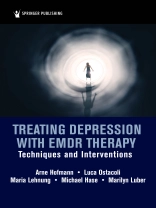Delivers the Evidence-Based Gold-Standard EMDR Protocol for Ameliorating Depression
This groundbreaking book introduces EMDR-Depr End, a pathogenic memory-based EMDR therapy approach. Depr End has been demonstrated in a number of studies and meta-analyses to be at least as effective—and often more effective—than other guideline-based therapies in treating depression, including cognitive behavioral therapy (CBT). EMDR-Depr End is particularly helpful with chronic and recurrent depression that does not respond well to other treatments. Written by the international research team who developed this quick-acting and efficient therapy, the text provides clinicians with the evidence-based tools they need to integrate EMDR-Depr End into their practices.
This text explains in depth a step-by-step approach to processing the pathogenic memory structures that are the basis of most depressive disorders and ways to address both depressive and suicidal states. Real-world case studies incorporate the often-co-occurring trauma-based disorders found in depressive patients. These are practical “how-to” chapters, including one devoted to drawing integration with numerous examples of actual patient drawings as clients go through the EMDR process. Abundant illustrations enhance understanding of stress and trauma-based depressive disorders and the successful interventions that improve client outcomes. Protocol scripts for therapist and client also help prepare readers to provide optimal treatment to their clients.
Key Features:
- Authored by the international research team who developed this touchstone EMDR therapy treatment
- Helps with chronic and recurrent depression especially if it is resistant to guideline-based treatments, including CBT
- Demonstrates step-by-step how to apply the Depr End protocol using real-world case examples
- Describes how EMDR’s neurobiological working mechanism effectively treats depression
- Includes protocol scripts and a review of randomized controlled trials related to EMDR and depression
- Illustrates how Depr End protocol reduces depressive relapses
Mục lục
List of Contributors
Acknowledgments
Introduction to Treating Depression with EMDR Therapy by Arne Hofmann
PART I. MEMORY WORK—A NEW METHOD FOR THE TREATMENT OF DEPRESSION: EMDR THERAPY
Chapter 1. EMDR Therapy as a New Treatment Approach
PART II. THE EMDR DEPREND TREATMENT MANUAL
Chapter 2. The EMDR Protocol for the Treatment of Depression (Depr End)
Chapter 3. Preparation and Stabilization in EMDR Therapy for Depressive Patients
Chapter 4. Processing Episode Triggers with EMDR Therapy
Chapter 5. Treating Belief Systems with EMDR Therapy
Chapter 6. Processing Depressive or Suicidal States with EMDR Therapy
Chapter 7. Relapse Prevention and EMDR Therapy
Chapter 8. Comorbidity with Complex Trauma-Related Disorders and EMDR Therapy
Chapter 9. The EMDR Drawing-Integration Technique (EMDR-DI): A Visual Approach to Complex PTSD, Dissociation, and Depressive States
PART III. FUTURE PERSPECTIVES OF EMDR THERAPY
Chapter 10. The State of Research and Practical Experience on Treating Bipolar Disorder with EMDR Therapy
Chapter 11. Traumatic Events and Severe Recurrent and Chronic Depression and EMDR Therapy: Clinical and Biological Issues
Chapter 12. Consequences for Practical Work with EMDR Therapy
PART IV. RESOURCES
Chapter 13. Randomized Controlled Scientific Studies on EMDR and Depression
Chapter 14. How to Fill the Symptom Event Map
Chapter 15. Finding a Certified EMDR Therapist
Giới thiệu về tác giả
Marilyn Luber, Ph D, is a licensed, clinical psychologist in private practice in Philadelphia. She was on the Founding Board of Directors of EMDRIA and an EMDR Task Force for Dissociative Disorders member. She has conducted training both nationally and internationally. She is a co-facilitator for the EMDR Global Alliance. She is on the Steering Committee for the Future of EMDR Therapy Project, on the Council of Scholars, and chair of the ‘What is EMDR’ working group. She received HAP’s Humanitarian Services Award (1997), Outstanding Contribution to EMDRIA award (2003) and EMDRIA’s Francine Shapiro Award (2005).












